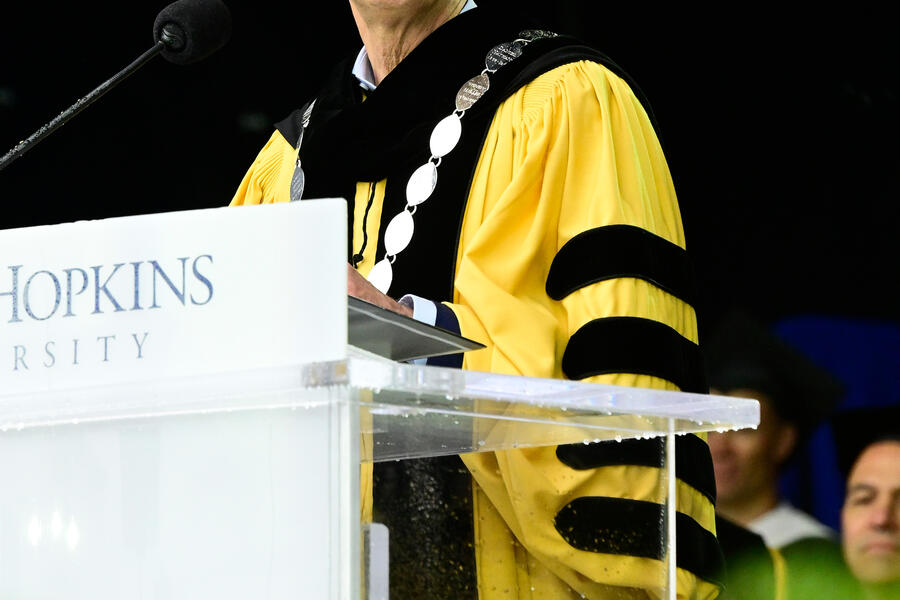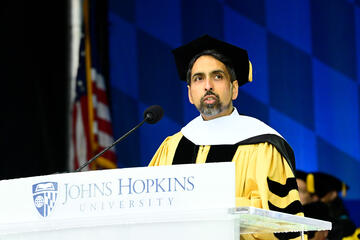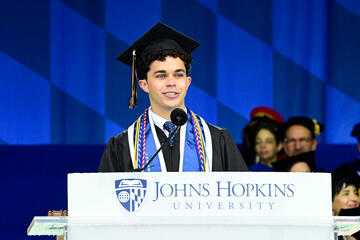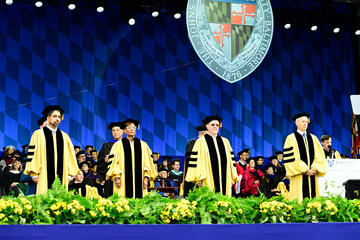Remarks as prepared for delivery by Johns Hopkins University President Ron Daniels at the universitywide Commencement ceremony on May 22, 2025.
Good morning, good morning to our alumni, trustees, staff, faculty, parents, family, friends—and of course, to our graduates. Welcome to the Commencement for the great, great Class of 2025!
So, you made it. You arrive here today at the end of a journey that began four years ago in a moment that was still beset by the uncertainty and constraints wrought by the COVID pandemic.
And yet, and yet, even in that moment of challenge, you were, as you are today, resilient.
You forged connections over your mutual disdain for the Freshman Quad Annex, the beloved Prodensity app, or the extended stay program at the Colonnade Hotel, including its 100-plus channels of cable and exquisite room service offerings.
You made your Hopkins journey your own, including following the essential daily guidance of Instagram icon @rychuthelegend.
And now, now you have made it to this moment: your graduation from Johns Hopkins University.
Looking out at all of you, and at your families and loved ones who traveled here today to celebrate your graduation, it is hard not to be filled with a strong sense of pride and optimism.
Two months ago, I experienced this same sense of pride and optimism when my family and I traveled to another university north of here for my son Drew's medical residency Match Day.
As many of you know, fourth-year medical students gather on the same day with their classmates and families to find out where they have matched and will do their residencies, which is the next stage in their medical training.
At precisely 12 noon EST, medical students across the country tear open their envelopes and they get the news. It is nail-biting and joyous in equal measure—as these moments of transition in our children's lives (and our own) are so often.
It was, in truth, a welcome respite from the cascade of challenges that confront us here at Hopkins and at universities across the country.
But as my wife Joanne and I looked around at the crowded auditorium of beaming medical students and their families—a tapestry of students reflecting all walks of life and cultures and backgrounds, a snapshot of this country at its best—we could not help but be moved by the promise and the importance of higher education that was revealed in that moment.
The intense attacks higher education has been weathering faded rapidly into the background. And in their stead, the true and glorious mission of the university came to the fore.
The sense of possibilities realized, of expertise conferred, of hard work and sacrifice rewarded. And of the critical role played by higher education in making all of this possible, of educating and conferring on soon-to-be doctors the ability to go out and make the country and the world a better place (literally) one patient, one diagnosis, one new therapy, one new procedure at a time.
And then, to top it off, we had this amazing Hopkins moment.
From across the room, I thought I saw a small group of students waving at me. I wasn't sure who they were until I heard them call out: "Ronny D." It turns out they had graduated from Hopkins before going to medical school. And yes, of course, we proceeded to do our selfies and photo op.
[Photo of alumni Blue Jays]
And that attracted another group of students who had just matched at Hopkins and who would soon be coming to Baltimore to commence their medical residencies.
[Photo of new Blue Jays]
So, this underscores an important point: No matter where you are, no matter where you go, no matter what you do, you are "Forever a Blue Jay!"
Rachelle Hernandez said I had to include that in my speech today.
Now, I have long acknowledged that universities aren't without blemish.
We are not perfect. Universities, like the nation of which we are part, are constantly in a process of becoming.
To be the best version of ourselves, we must subject ourselves to the same exacting standards of review that we apply to others and to our research. And where we fall short, we must change. We must do repair.
But whatever our flaws, whatever our stumbles, we cannot lose sight of how good, how indispensable research universities like Johns Hopkins—and students like you—are to the national fabric and to the world beyond.
The modern American research university, of which Hopkins was the first, stands as an institution that is, I believe, unmatched in its capacity to promote individual flourishing and societal advancement. Standing at the core of that success is the extraordinary research compact that was painstakingly forged between America's research universities and the federal government in the wake of the Second World War.
That compact has produced a bounty of innovation and impact that is as astounding today as it was then: the internet, the cell phone, the reduction in the death rate of cancer by 33%, GPS, and the technology that knocked asteroids off course—invented right here at Johns Hopkins University.
And there is so much more.
Graduates and families, the case for our cause is strong.
And I know that you would not be here—after four years, from across the country and around the world, in inclement weather—if you did not share my belief, our belief, in the transformative power of higher education to support this country's highest and most vaunted aspirations.
Thank you—not only for making the trek, but for believing in us and in your graduates who are here today.
And here, I want to do a special shout-out to all our FLI students who today are proudly wearing their light blue stoles, signifying that they are the first generation of their families to go to college. And I would ask them, please stand. Please stand.
[Applause]
Your presence here today, and over the last four years, is proof positive that the ideal of equal opportunity can, is, and must be honored in places like ours.
To all our graduates: While the conclusion of your time here at Hopkins has been long dreamed of, now that it is here, I am wagering (I guess I am hoping) that it is tinged with just a little bit of nostalgia for what you are leaving behind.
Endings are never easy. But in some respects, neither are beginnings.
In just a few hours' time, you will be embarking on a host of new beginnings. Maybe it's your first real full-time job in the real world … graduate or professional programs … research and community internships … international fellowships.
Those opportunities and many more are fast approaching, as are the nagging questions that, for many of us, will come with them: Will I fare as well as I did during my time at Hopkins in this next endeavor? Will I suffer setbacks or failures? Of course you will. How often and how big might they be? And when those inevitable disappointments or stumbles occur, what do I do next?
There are many possible ways you could react in such a moment, but from what I've seen in you over the past few years, I expect that without hesitancy, you will simply opt to "begin again".
To begin again.
I want to dwell on this idea for a moment.
This pithy phrase—"to begin again"— is particularly salient for me right now for a somewhat improbable reason.
This past fall, I participated in—or, perhaps more accurately, subjected myself to—a, wait for it, three-day silent meditation retreat with 30 perfect strangers. This I did at the insistence of my son Ryan, a devoted meditator who has long advocated for my exploring the benefits of meditative practice.
But, as many of you may have surmised, I am uniquely ill-suited for this endeavor.
I don't think I've sat in silence for more than two minutes in my entire waking life.
And the prospect of a dawn to dusk meditation was something I approached the way you might have a dreaded advanced course in Cell Bio or Thermodynamics—I downloaded the app and crammed a few days before the retreat to do my introduction to meditation.
Periodically during the retreat, our instructor would take questions from the group.
Nearly everyone confessed, spoke of how arduous it was to quiet one's mind, to cease thinking about work, about family, about the presentation next week, or the forgotten dog food order.
And to a person, each time these thoughts surfaced and disrupted their meditation, we all felt the same sense of failure, of being overwhelmed by what to do next, what to fix.
In response to these confessions of failure, our group's leader would always offer the same, simple response: simply, begin again.
Distraction, he insisted, should not be viewed as failure. The next time might be better. What matters is not the failure behind you, but the prospect of success the next time you try.
So, he urged us, to begin again.
Now, while it may be a long time—OK, a very long time—before I try another silent retreat, that simple injunction, to begin again, has stuck with me.
Because you see, to begin again does not imply your previous effort was wasted or that you must take drastic steps to change something. Nor does it mean that the goal you were pursuing is wrong or ill-conceived.
Rather, to begin again is a simple call, nay an exhortation, to keep at it.
To begin again is different than merely beginning. You can begin anything. But to begin again is a choice to keep going, to re-commit, to bring fresh energy and perspective to an endeavor that means something to you.
And you, Class of 2025, we know you are a group with the fortitude and persistence not just to begin, but to begin again, and again.
You are the class of the SGA members who worked doggedly and scored free iClickers for their classes.
The class with the violinist who practiced the solo part in Richard Strauss's Also Sprach Zarathustra—hard to play, harder to say—until it became second nature.
The class with the student who toiled over their Design Day project prototype to emerge with a low-cost solution to burn care in low-income countries.
And you were the class that had this extraordinary quarterback, who bounced back from a 28-point loss on Homewood Field to throw completion after completion to drive the team's 10-game winning streak and secure a conference championship.
Indeed, if one were to ask each of the honorary degree recipients seated on this stage about their path to the many achievements that we celebrate here today, I suspect they would each tell you that they, too, had to honor, repeatedly and sometimes painfully, the simple injunction to begin again.
Similarly, if you asked any of your professors what it took to complete their manuscript or symphony, draw conclusions from their ungainly data set, or invent new surgical techniques, they too would tell you that they often had to begin again and again.
And so, to the great Class of 2025, my prayer, my hope, my dream for you today is simple: Take the precious gifts of higher education that you have received here, the friendships you have forged, the myriad experiences gained and begin again in whatever calling summons your greatest passion and dedication.
And in doing so, go out and make our world better. We could use it. Godspeed—and congratulations, Class of 2025!
Posted in University News
Tagged commencement 2025











